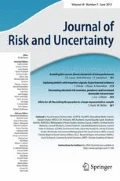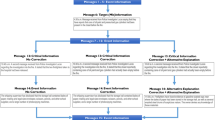Abstract
Regret theory predicts that choices over prospects will be systematically influenced by the juxtaposition of outcomes in the payoff matrix. Experiments have found apparent juxtaposition effects of this kind. However, these experiments have not controlled for “event-splitting effects” (ESEs), by which the subjective weight given to an outcome depends on the number of states of the world in which it occurs, as well as on their combined probability. An experiment is reported that tests independently for juxtaposition effects and ESEs. The results suggest that the apparent juxtaposition effects found in previous experiments are largely due to ESEs.
Similar content being viewed by others
References
Battalio, Raymond, John Kagel, and Romain Jiranyakul. (1990). “Testing Between Alternative Models of Choice Under Uncertainty: Some Initial Results,”Journal of Risk and Uncertainty 3, 25–50.
Harless, David. (1992). “Actions versus Prospects: The Effect of Problem Representation on Regret,”American Economic Review, 82, 634–649.
Holt, Charles. (1986). “Preference Reversals and the Independence Axiom,”American Economic Review 76, 508–515.
Kahneman, Daniel, and Amos Tversky. (1979). “Prospect Theory: An Analysis of Decision under Risk,”Econometrica 47, 263–291.
Loomes, Graham. (1988a). “Further Evidence of the Impact of Regret and Disappointment in Choice under Uncertainty,”Economica 55, 47–62.
Loomes, Graham. (1988b). “When Actions Speak Louder than Prospects,”American Economic Review 78, 463–470.
Loomes, Graham, Chris Starmer, and Robert Sugden. (1991) “Observing Violations of Transitivity By Experimental Methods,”Econometrica 59, 425–439.
Loomes, Graham, Chris Starmer, and Robert Sugden. (1991) “Are Preferences Monotonic: Testing Some Implications of Regret Theory,”Economica 59, 17–33.
Loomes, Graham, and Robert Sugden. (1987a). “Some Implications of a More General Form of Regret Theory,”Journal of Economic Theory 41, 270–287.
Loomes, Graham, and Robert Sugden. (1987b). “Testing for Regret and Disappointment in Choice under Uncertainty,”Economic Journal 97 (Supplement), 118–129.
Starmer, Chris. (1992). “Testing New Theories of Choice under Uncertainty Using the Common Consequence Effect,”Review of Economic Studies, 59, 813–830.
Starmer, Chris, and Robert Sugden. (1989). “Probability and Juxtaposition Effects: An Experimental Investigation of the Common Ratio Effect,”Journal of Risk and Uncertainty 2, 159–178.
Starmer, Chris, and Robert Sugden. (1991). “Does the Random Lottery Procedure Elicit True Preferences? An Experimental Investigation,”American Economic Review 81, 425–439.
Sugden, Robert. (1993). “An Axiomatic Foundation for Regret Theory,”Journal of Economic Theory, forthcoming.
Viscusi, W. Kip. (1989). “Prospective Reference Theory: Toward an Explanation of the Paradoxes,”Journal of Risk and Uncertainty 2, 235–264.
Weber, Martin, Franz Eisenführ, and Detlof von Winterfeldt. (1988). “The Effects of Splitting Attributes on Weights in Multiattribute Utility Measurement,”Management Science 34, 431–445.
Author information
Authors and Affiliations
Additional information
The research reported in this article was supported by the Economic and Social Research Council of the UK (award numbers R 00 23 2236 and R 000 23 2269) and by the Economics Research Centre of the University of East Anglia. We are grateful to Judith Mehta for help in carrying out the experiments, and to the editor and two anonymous referees for valuable comments. The idea that our previous experiments might have revealed event-splitting effects rather than juxtaposition effects was first suggested to us by Stephen Davies.
Rights and permissions
About this article
Cite this article
Starmer, C., Sugden, R. Testing for juxtaposition and event-splitting effects. J Risk Uncertainty 6, 235–254 (1993). https://doi.org/10.1007/BF01072613
Issue Date:
DOI: https://doi.org/10.1007/BF01072613




